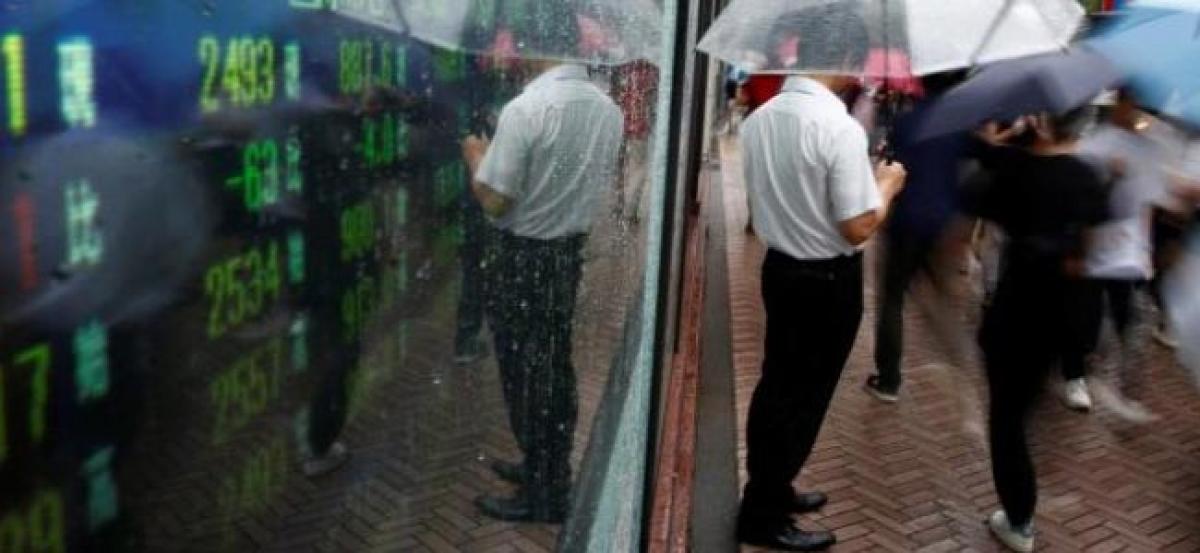Live
- PM Modi highlights govt's efforts to make Odisha prosperous and one of the fastest-growing states
- Hezbollah fires 200 rockets at northern, central Israel, injuring eight
- Allu Arjun's Family Appearance on Unstoppable with NBK Breaks Viewership Records
- Unity of hearts & minds essential for peace & progress, says J&K Lt Governor
- IPL 2025 Auction: I deserve Rs 18 cr price, says Chahal on being acquired by Punjab Kings
- EAM Jaishankar inaugurates new premises of Indian embassy in Rome
- Sailing vessel INSV Tarini embarks on second leg of expedition to New Zealand
- Over 15,000 people affected by rain-related disasters in Sri Lanka
- IPL 2025 Auction: RCB acquire Hazlewood for Rs 12.50 cr; Gujarat Titans bag Prasidh Krishna at Rs 9.5 crore
- Maharashtra result reflects the outcome of Congress' destructive politics: BJP's Shazia Ilmi
Just In

Asian stocks advanced on Thursday, propelled by strong U.S. earnings and oil prices near a 15-month high, while the Mexican peso hit a six-week high after the final U.S. presidential debate before the Nov. 8 election.
Asian stocks advanced on Thursday, propelled by strong U.S. earnings and oil prices near a 15-month high, while the Mexican peso hit a six-week high after the final U.S. presidential debate before the Nov. 8 election.
European shares were set to open flat to slightly higher, with financial spreadbetters predicting Britain's FTSE 100 and France's CAC 40 would start the day little changed and Germany's DAX would be up 0.2 percent.
MSCI's broadest index of Asia-Pacific shares outside Japan rose 0.2 percent. Japan's Nikkei extended gains to 1.1 percent as the yen weakened.
China's CSI 300 was little changed, while Hong Kong's Hang Seng index climbed 0.6 percent.
In the third and final debate between Republican presidential candidate Donald Trump and Democrat Hillary Clinton, Trump tried to reverse the momentum in an election that polls show is tilting away from him.
"Never in the history of the U.S. has a candidate faced such a deficit in the polls as Trump currently holds, with at least two well-known sites (that model the probability of the outcome) putting an 85-90 percent chance of a Clinton win," Chris Weston, chief market strategist at IG in Melbourne, wrote in a note."But as 2016 has shown us, not just in politics, but in markets too, it can often pay to expect the unexpected."
The U.S. dollar held steady at 18.5027 Mexican pesos, after earlier touching 18.44 pesos, the lowest since Sept. 9. It is down 2.6 percent this week against the Mexican currency.
Trump's radical positions on Mexican migration and trade could severely disadvantage the U.S's southern neighbor if he wins, so a stronger Mexican peso reflects lower market expectations of a Trump win.
In the debate, Trump refused to say whether he would accept the outcome of the Nov. 8 election, after earlier urging supporters to patrol polling places in inner cities to prevent voter fraud.
Trump and Clinton sparred over the influence of Vladimir Putin, with Clinton calling Trump the Russian president's puppet and Trump claiming Putin had repeatedly outsmarted Clinton.
Trump called Clinton "a nasty woman" and accused her campaign of orchestrating a series of accusations by women who said the businessman made unwanted sexual advances against them. He said the stories were "totally false".
Overnight, the S&P 500 index and the Dow Jones Industrial Average closed up 0.2 percent, after Morgan Stanley posted a better-than-expected quarterly profit to round out a string of solid results from big U.S. banks.
With 70 companies in the S&P 500 having reported earnings through Wednesday morning, 80 percent have topped expectations. Third quarter earnings are now expected to increase 0.5 percent, according to Thomson Reuters I/B/E/S, which would be the first quarter of growth in five.
Energy shares also contributed to the gains on Wall Street, as oil prices jumped after a surprisingly large inventory drop of 5.2 million barrels, compared with a forecast for a 2.7-million barrel build. It was the sixth week of declines in seven weeks.
U.S. crude slid 0.5 percent to $51.34 a barrel on Thursday, after surging 2.6 percent to close at $51.60 in the previous session. It earlier touched $51.93, the highest since July 2015.
Brent crude pulled back 0.4 percent to $52.46, after climbing 1.9 percent on Wednesday.
The dollar rose 0.3 percent to 103.75 yen on Thursday after falling 0.4 percent on Wednesday.
The Australian dollar retreated 0.7 percent to $0.7666 after a surprisingly negative jobs report. Australia shed a whopping 53,000 full-time jobs in September, although the unemployment rate held at a three-year low of 5.6 percent as the participation rate fell to 65.5 percent, the lowest since May 2014.
The euro fell 0.1 percent to $1.0963 ahead of the European Central Bank's policy meeting on Thursday.
Investors expect the ECB to keep policy unchanged, but are focused on whether ECB President Mario Draghi will give any indication of if and when the central bank may begin tapering its bond purchase program.
Keeping interest rates and an 80-billion-euro per month bond buying program unchanged, Draghi will likely emphasize the continued need for monetary stimulus, reinforcing expectations for an extension of the ECB's asset buys beyond its scheduled end next March.
Michael Hewson, chief market analyst at CMC Markets in London, expects no policy change.
But Draghi "is likely to face extensive questioning about recent reports about a tapering program, the timing of which seems rather curious, given that most speculation is about whether the ECB will look at extending its QE program beyond March 2017," he wrote in a note.

© 2024 Hyderabad Media House Limited/The Hans India. All rights reserved. Powered by hocalwire.com







